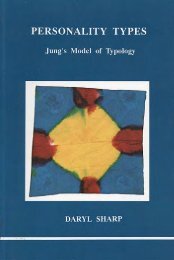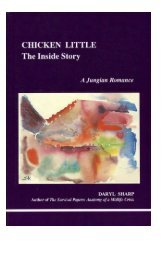Digesting Jung: Food for the Journey - Inner City Books
Digesting Jung: Food for the Journey - Inner City Books
Digesting Jung: Food for the Journey - Inner City Books
Create successful ePaper yourself
Turn your PDF publications into a flip-book with our unique Google optimized e-Paper software.
More on Fantasies 111<br />
you listen to what it says back. You write this down to make it real,<br />
to give it substance. That’s <strong>the</strong> difference between active imagination<br />
and a daydream. If you don’t fix it in time and space, it’s pie<br />
in <strong>the</strong> sky.<br />
Active imagination can also take <strong>the</strong> <strong>for</strong>m of dreaming a dream<br />
on—you pick up <strong>the</strong> action at <strong>the</strong> end of a dream and imagine what<br />
might happen next. This is a good way to learn more about your<br />
complexes, but to do it successfully you have to still your skeptical,<br />
rational mind, which will call it nonsense and say you made it all<br />
up. And of course you did—but who is “you”? Nonsense it may<br />
seem, but wisdom it may hold.<br />
<strong>Jung</strong> emphasized that <strong>for</strong> active imagination to be psychologically<br />
useful, which is to say trans<strong>for</strong>mative, one has to move beyond<br />
a merely aes<strong>the</strong>tic appreciation of <strong>the</strong> action or images and<br />
take an ethical stand toward <strong>the</strong>m—relate <strong>the</strong>m to what is happening<br />
in your life, and judge <strong>the</strong>ir meaning in that context:<br />
As a rule <strong>the</strong>re is a marked tendency simply to enjoy this interior entertainment<br />
and to leave it at that. Then, of course, <strong>the</strong>re is no real<br />
progress but only endless variations on <strong>the</strong> same <strong>the</strong>me, which is not<br />
<strong>the</strong> point of <strong>the</strong> exercise at all. . . . If <strong>the</strong> observer understands that<br />
his own drama is being per<strong>for</strong>med on this inner stage, he cannot remain<br />
indifferent to <strong>the</strong> plot and its dénouement. He will notice, as<br />
<strong>the</strong> actors appear one by one and <strong>the</strong> plot thickens, that <strong>the</strong>y all have<br />
some purposeful relationship to his conscious situation, that he is being<br />
addressed by <strong>the</strong> unconscious and that it causes <strong>the</strong>se fantasyimages<br />
to appear be<strong>for</strong>e him. 109<br />
Recognizing your own involvement, you are <strong>the</strong>n obliged to enter<br />
into <strong>the</strong> process with your personal reactions, just as if you were<br />
one of <strong>the</strong> fantasy figures—as if <strong>the</strong> drama being enacted were real.<br />
As indeed it is, <strong>for</strong> psychic facts are quite as real as table-tops. If<br />
you place yourself in <strong>the</strong> drama as you really are, not only does it<br />
gain in actuality but you also create, by your criticism of <strong>the</strong> fantasy,<br />
an effective counterbalance to its tendency to get out of hand.<br />
109 Mysterium Coniunctionis, CW 14, par. 706.










